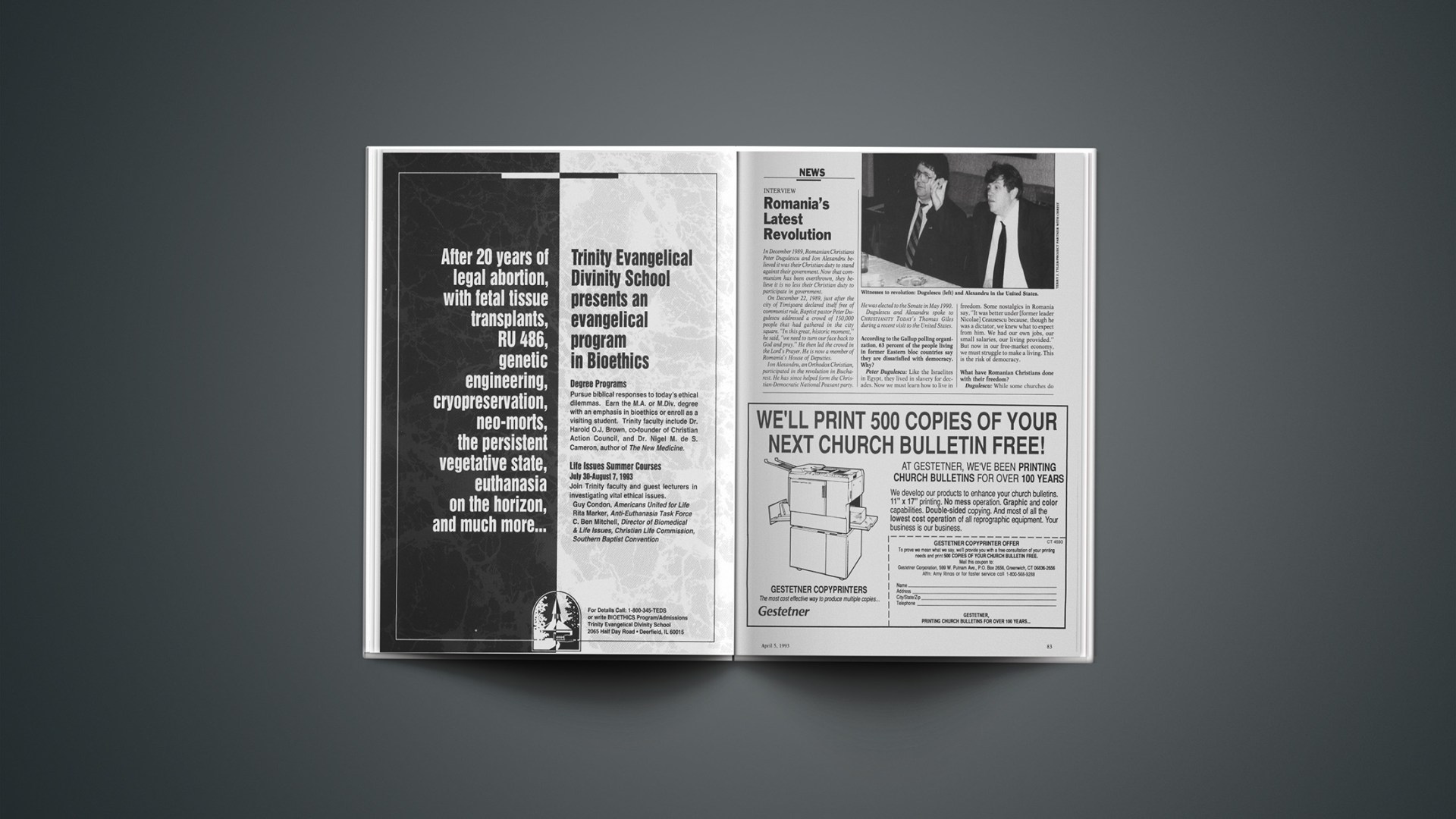In December 1989, Romanian Christians Peter Dugulescu and Ion Alexandru believed it was their Christian duty to stand against their government. Now that communism has been overthrown, they believe it is no less their Christian duty to participate in government.
On December 22, 1989, just after the city of Timişoara declared itself free of communist rule, Baptist pastor Peter Dugulescu addressed a crowd of 150,000 people that had gathered in the city square. “In this great, historic moment,” he said, “we need to turn our face back to God and pray.” He then led the crowd in the Lord’s Prayer. He is now a member of Romania’s House of Deputies.
Ion Alexandru, an Orthodox Christian, participated in the revolution in Bucharest. He has since helped form the Christian-Democratic National Peasant party.
He was elected to the Senate in May 1990.
Dugulescu and Alexandru spoke to CHRISTIANITY TODAY’s Thomas Giles during a recent visit to the United States.
According to the Gallup polling organization, 63 percent of the people living in former Eastern bloc countries say they are dissatisfied with democracy. Why?
Peter Dugulescu: Like the Israelites in Egypt, they lived in slavery for decades. Now we must learn how to live in freedom. Some nostalgics in Romania say, “It was better under [former leader Nicolae] Ceausescu because, though he was a dictator, we knew what to expect from him. We had our own jobs, our small salaries, our living provided.” But now in our free-market economy, we must struggle to make a living. This is the risk of democracy.
What have Romanian Christians done with their freedom?
Dugulescu: While some churches do not know how to use these freedoms, most of us are able to plant new churches, preach the gospel in the streets, organize crusades in soccer stadiums and cultural halls—even teach the Bible in public schools.
Why are you involved in politics?
Dugulescu: The platform of the Christian-Democratic National Peasant party emphasizes Christian ethics. As a party, it seeks to contribute to the regeneration of the Romanian nation on the basis of Christian morality.
I never sought to become a politician—I didn’t even like politics—but when I first read the platform, I thought, I want to be a part of this work. So I became a member of the party. Later, I was asked to run for elections because I am very well known in my district. I accepted, won, and became the first evangelical Christian in all Parliament.
Ion Alexandru: Since we both had participated in the revolution, we felt it was our responsibility to become involved in politics. If we do not fulfill the work of God after the revolution, people will have the right to say, “You overthrew communism, but you didn’t bring God into our homes.”
What are your most significant political accomplishments?
Alexandru: We have introduced the study of the Bible and world religions into our public schools. We also have fought hard to insert the words “so help me, God” at the end of the presidential oath, and for churches to receive five hectares of land for their use.
What have been your most surprising political challenges?
Alexandru: The most surprising, and greatest, challenge is abortion.
Dugulescu: Under Ceausescu, abortion was forbidden, though not for moral reasons.
A lot of people emigrated during his regime; so he outlawed abortion in order to increase the population.
Alexandru: Since the revolution, after the new regime opened the door for abortion, there have been more than three million unborn children killed.
Is there a prolife movement in Romania?
Alexandru: Virtually all our political parties support abortion rights for fear of losing popularity; even ours keeps its neutrality. So the only force defending innocent babies is the church.
Dugulescu: Ion and an Orthodox priest have organized the country’s first prolife group.










